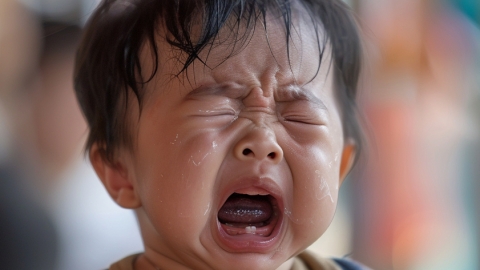What does it mean when a child trembles after being scolded or physically punished?
A child trembling after being scolded or physically punished may be experiencing physiological tremors due to stress response, autonomic nervous system excitation, post-traumatic stress reaction, anxiety state, or acute stress disorder. If discomfort symptoms occur, it is recommended to seek timely medical evaluation and treatment at a正规 hospital. Specific analyses are as follows:

1. Physiological tremor under stress response: Severe fear triggered by scolding or punishment causes the body to rapidly release adrenaline, leading to involuntary muscle contractions and shaking. After stopping the punishment, placing the child in a calm environment and gently comforting them with soft words will help their emotions stabilize, gradually reducing the tremors.
2. Autonomic nervous system excitation: Fearful stimuli can disrupt autonomic nerve function, increasing heart rate and causing blood vessel constriction, often accompanied by muscle tremors. Gentle hugging and slow physical comfort can help the child relax and regulate autonomic nervous system activity.
3. Anxiety state: Prolonged or frequent scolding and punishment can leave a child in a persistent state of anxiety, manifesting as trembling, restlessness, and disturbed sleep. Psychological counseling under medical guidance may help alleviate symptoms; if necessary, medications such as pediatric-specific sertraline hydrochloride tablets, lorazepam tablets, or buspirone tablets may be prescribed. It is essential to avoid further instances of scolding or physical punishment.
4. Post-traumatic stress reaction: A single severe incident of scolding or punishment may leave psychological trauma, triggering tremors when facing similar situations again, along with nightmares or avoidance of discussing the traumatic experience. Doctors may recommend trauma-focused psychotherapy and, if needed, prescribe fluvoxamine maleate tablets, paroxetine tablets, or venlafaxine extended-release tablets to aid in psychological recovery.
5. Acute stress disorder: Intense scolding or punishment may trigger an acute stress response, causing not only tremors but also confusion and emotional numbness. Physicians might prescribe oxazepam tablets, alprazolam tablets, or estazolam tablets to stabilize mood, along with emergency psychological interventions to prevent chronic progression.
In daily life, parents should avoid using scolding or physical punishment for discipline, instead adopting encouraging and guiding communication methods. Pay close attention to children's emotional changes and intervene promptly if abnormalities are detected.




